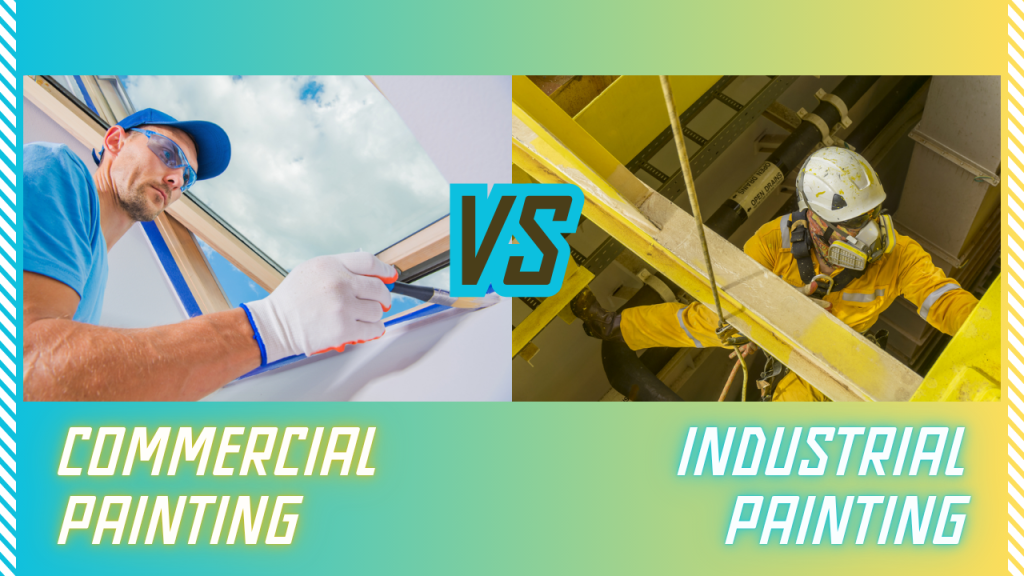Commercial vs. Industrial Painting: Everything You Need to Know

Most people just think of painting as a way to make their space beautiful & functional. Simple enough, right?
But for professionals, painting a building is a complex process involving several details. Businesses ask us for a painting job but very few can differentiate between commercial & industrial painting.
Yup, they both sounds similar & involve paint. But their purpose, process, and results are totally different from one another.
At Final Touch Paint & Decor, we specialise in expert residential & commercial painting. With over 30 years of experience in Perth, we’re well versed in what each type of painting demands & how it’s done right.
Let us help you figure out what sets commercial painting apart from industrial painting, and how to choose the right contractor for your job.
What Is Commercial Painting?
Commercial painting gives a refresh to shops, offices, schools, cafes, and any public-facing businesses. It makes a space look good to customers, clients, and employees, so, focus is on aesthetics and durability.
Common surfaces to paint include:
- Interior walls and ceilings in offices, clinics, schools
- Exterior facades of shopfronts and office blocks
- High‑traffic areas: lobbies, corridors, restrooms
- Retail spaces: floors, shelving, signage walls
- Decorative finishes: accent walls, woodwork, trim
It involves the bold colours for brand identity or calming tones for a professional atmosphere. So, the space can feel inviting and attract more customers.
Though durability matters too, because the space faces daily hustle and bustle. Professional commercial painters Perth use paints suited for foot traffic, frequent cleaning, and daily wear and tear.
What is Industrial Painting?
Industrial painting is a completely different beast. It’s not about appearances, but performance and protection. Industrial coatings protect steel beams, machinery, storage tanks, and pipes from corrosion, wear, extreme heat, chemicals, moisture, and more.
These spaces include:
- Factories
- Warehouses
- Power plants
- Production facilities
The main job here is to prevent corrosion, extend the life of expensive equipment, and meet strict safety standards. This heavy-duty work is handled by trained industrial painters Perth who understand the complexities of industrial machinery.
Commercial vs. Industrial Painting: Comparing Characteristics
Let’s discuss how both painting jobs differ and why they need different types of specialists.
1. Purpose
Commercial painting is done to make the space visually appealing, welcoming & reflective of a company’s professionalism.
The goal is to impress customers, create a positive working environment for staff, and contribute to reputation of the business. So, there will be colour schemes, clean lines, and finishes matching the brand’s image.
Industrial painting, on the other hand, is purely about protection and function. Because the focus isn’t on impressing anyone. You just want to safeguard surfaces against harsh industrial conditions. Plus, there are strict safety compliances involved.
That’s why, coatings create less visual impact, but more long-term durability & protection.
2. Surfaces
Commercial painting covers materials you’d find in any everyday building. E.g.
- Plasterboard
- Drywall
- Timber
- Masonry
- Ceilings
- Rendered exteriors
These surfaces demand smooth finishes, aesthetic appeal, and easy maintenance. Floors are also painted for foot-traffic, but the demands are less harsh than industrial wear.
Industrial painting, on the other hand, deals with much tougher & more complicated surfaces. E.g.
- Exposed steel beams
- Machinery
- Storage tanks
- Concrete floors built to withstand forklifts
- Pipelines
- Exterior structures
They all are exposed to harsh weather or chemicals. Hence, they need extensive preparation like sandblasting or chemical cleaning before coating. It as for maximum adhesion and protection under demanding conditions.
3. Paint Types
The type of coating differs according to purpose and surface types.
Commercial painting services use latex, acrylic, and other water-based paints. As they have vibrant colour range, ease of application & fast drying times. Plus, their lower environmental impact makes them suitable for sustainable painting services.
They look good and hold up under the foot traffic, cleaning, and changing trends.
Industrial painting requires coatings that go far beyond appearance. E.g. epoxy, polyurethane, zinc primers, and specialised fire-retardant paints.
They offer resistance to chemicals, corrosion, UV radiation, high heat, and physical impact. Though there is no decorative finish but high durability. So, they prevent costly damage, extend the life of equipment, and comply with health and safety regulations.
4. Tools & Equipment
Like paint types, the tools and equipment are also different for both options.
Commercial building painters rely on brushes, rollers, and airless spray systems to achieve neat & professional finishes. These tools suit more to clean, indoor environments and relatively smooth surfaces.
While industrial painters Perth work with a very different toolkit. The preparation alone requires sandblasters or abrasive blasters to strip surfaces back to bare metal. Application equipment also involves industrial-grade sprayers to handle thick coatings.
Moreover, there is also extensive safety equipment. Like scaffolding, harnesses, respirators, and confined-space gear, especially in high-risk environments.
5. Techniques
The techniques involved in commercial painting require intricate skills.
Because there are clean lines, smooth application, consistent finishes, and proper layering of primers and topcoats to achieve a professional look. They follow predictable processes and timelines to minimise disruption.
Industrial painting is far more technical and demanding.
Surfaces require meticulous preparation to adhere the coatings. Drying times, curing conditions, and application methods must all follow strict guidelines. Safety protocols are rigorous and that’s why, there are defined techniques & proactive approach.
6. Skill & Training
Commercial painters Perth are skilled to create polished finishes, execute colour schemes. They work efficiently without disrupting business operations. So, they should be adept in communication & delivering timely crisp results meeting client expectations.
Industrial painting demands an even deeper level of expertise.
Painters must be trained in:
- Handling hazardous materials
- Working at heights
- Confined space entry
- Understanding the specialised coatings
Certifications in health and safety, confined space work, and compliance with industry standards are also mandatory. So, there’s not only technical skill that’s required, but a know how of critical infrastructure & challenging environments.
7. Cost
Costs for commercial painting are determined by:
- Size of the project
- Number of rooms
- Level of detail required
- Materials chosen
While not cheap, these projects are more affordable and predictable. Because they follow established processes and use readily available products.
Industrial painting has a higher price tag because of the complexity involved. Surface preparation alone can be a major cost factor. As abrasive blasting & other intensive treatments are required.
Materials are more expensive because of their specialist nature. Plus, if there’s a need for certified & skilled technicians, then, count high labour costs too. Downtime, safety compliance, and extended timelines also impact the overall budget.
Aspect | Commercial Painting | Industrial Painting |
Purpose | To create an appealing, brand‑aligned, and clean look | To protect assets from corrosion, heat, chemicals and wear |
Surfaces | Walls, ceilings, trim, exteriors, floors | Steel beams, machines, tanks, pipes, industrial floors |
Paint Type | Latex, acrylic, low‑VOC, decorative finishes | Epoxy, polyurethane, zinc coatings, fire‑resistant coatings |
Equipment | Rollers, brushes, standard sprayers | Sandblasters, industrial sprayers, grinders, scaffolding |
Preparation | Cleaning, minor repairs, priming | Heavy prep: sandblasting, degreasing, priming |
Technique | Single or double coat application, clean edges | Multi‑layer systems, specialised application, strict drying times |
Skill & Training | Skilled in neat lines, trim work, colour matching | Industrial expertise, safety training, confined‑space procedures |
Health & Safety | Standard precautions, ventilation | PPE, respirators, hot work permits, confined‑entry compliance |
Cost Structure | Mid‑range: depends on area and type of finish | High: materials + prep + special techniques + compliance |
Typical Timeline | Completed in days or weeks, depending on size | Take weeks to months due to complex prep & layers |
Choosing the Right Team for the Job
All these differences ask for the experienced team in each painting job. You just can’t hire a professional in commercial painting for your industrial project.
If you want neat edges, vibrant colours, and an impressive finish, look for experienced commercial building painters. But if the coatings need to survive chemical spills or high heat, pick a crew that specialises in industrial painting.
Also, you need to be highly specific in the hiring process. Read on to find out how.
Tips Before Hiring an Industrial or Commercial Painting Contractor
Some tips from our side can help you pick the right professional for your painting project and get the needed results. All you have to do is:
Ask for portfolios. Check their expertise.
- Be clear about your goals, appearance vs. protection.
- Don’t focus solely on price. Cheap can get expensive fast.
- Check the portfolios, certifications, and customer reviews.
- Make sure they understand the scope of your work.
- Ask about paint types, materials, & techniques that will be used.
- Confirm timelines to minimise downtime.
Final Touch Paint & Decor ticks all these boxes. We’ve been painting Perth inside and out for decades. So, we have the skills, products, and care required for your job.
Common Misconceptions to Avoid
Misconception | Reality |
Any good painter can do industrial work. | Nope! you need specialists with the right materials, training, and equipment. |
Industrial paint will make my café more durable for high traffic. | Industrial coatings are rugged and they can’t provide the aesthetics. |
Mixing both techniques is fine. | Combining commercial visuals with industrial performance is possible, but needs expert planning and higher costs. |
Eco-friendly options don’t exist for industrial jobs. | They do! At Final Touch Paint & Decor, our Sustainable Painting Services include low VOC industrial options where suitable. |
Need Expert Residential & Commercial Painting in Perth?
Chat to Final Touch Paint & Decor Today
We’re your go-to house painters Perth that can help you in both options. If you want beautiful, brand‑focused commercial painting service, or tougher options, reach out to us. We bring experience, clarity, and care to every job.

